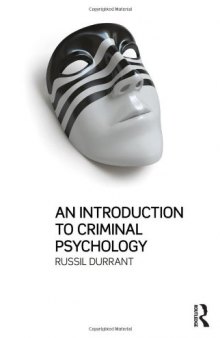 جزییات کتاب
جزییات کتاب
روانشناسی جنایی شاخهای از دانش روانشناسی است که به عوامل روانی مربوط به جرم و بزهکاری میپردازد. روانشناسی جنایی علم مطالعه شخصیت بزهکاران و نیز روشهای بازاجتماعی شدن آنان و بررسی نقش محیط (به معنای عام) بر رفتار مجرمانه است. به بیان جامعتر میتوان اینگونه بیان کرد که علم مطالعهٔ شخصیت تبهکار و شناخت دلایل و انگیزههای تبهکاری است که این دلایل و انگیزهها به شیوههای جامعهپذیری، اجتماعی شدن، تجربههای دوران کودکی و محیط زندگی و همچنین نقش ژنتیک و اختلالات روان شناختی در ایجاد شخصیت فرد تبهکار در هنگام اعمال جرم اشاره میکند. در یک جمله روانشناسی جنایی را میتوان ((مطالعهٔ علمی رفتار جنایی و فرایندهای ذهنیای که در ارتکاب جرم نقش دارند))، تعریف کرد.
کار روانشناسان جنایی معمولاً یافتن روشهایی برای پیشگیری از جنایت دوبارهٔ مجرمین باسابقه یا جنایتکاران دارای اختلال روان است. از وظایف دیگر این گونه روانشناسان، تهیه کردن پروندههای روانشناختی برای بزهکاران باسابقه و پرسابقه و بررسی دلایل روحی و روانی این جنایتها است.
Crime is a topic that is of considerable interest to policy-makers, politicians andthe public alike. We want to know what factors can explain the nature andprevalence of crime in society and use this knowledge to better develop approaches for managing criminal behaviour. This book provides a comprehensive overview of approaches to understanding crime and criminal behaviour, with a focus on psychological perspectives. A wide range of different types of criminal behaviour are considered, including juvenile crime, violent offending, sexual offending, collective violence and drug use. For each type of offence a clear overview of key conceptual and methodological issues is provided, along with a detailed consideration of the major theoretical approaches that have been developed. The book concludes by considering how our theoretical understanding of crime can inform our responses to criminal behaviour in terms of punishment, prevention and rehabilitation. Key features of the book include: • an in-depth coverage of a broad range of different types of criminal behaviour; • inclusion of a diverse range of different theoretical perspectives; • accessibly written, with extensive use of case studies, boxes and activities; • an extensive use of up-to-date references that highlight the current state of knowledge in the field of criminal psychology. This book should be of interest to students, academics, researchers and practitioners with an interest in criminal behaviour, and is particularly suitable for undergraduate courses in criminal psychology, forensic psychology and psychological criminology.
 دانلود کتاب
دانلود کتاب
 جزییات کتاب
جزییات کتاب








 این کتاب رو مطالعه کردید؟ نظر شما چیست؟
این کتاب رو مطالعه کردید؟ نظر شما چیست؟
